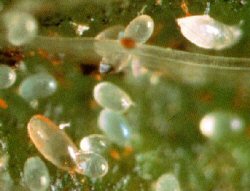Orange Jewelweed – Impatiens Capensis by A. Walden
TheGardenLady received this question from Howard.
I have a North facing brownstone garden with partial sun here in Manhattan, New York City. Each year a good portion of the semi-shady part of the garden is planted with impatiens. They are the seedlings from the previous year so that I can enjoy them in the apartment during the cold months. When transplanted outside, the plants grow two to four feet tall and have volumes of flowers which produce large indefinite quantities of seedlings- continuing the cycle. I feed everything in the garden from my compost and that which I clean from the Koi Pond filter. At three AM the entire garden gets automatically rained upon daily for 15 minutes with sprinkler hoses wired to the top of all three fences. Recently this year (all I can describe them as) ‘Knots’ have formed on the tops of the plants. (I have a photograph to show upon your request.) It is the stunting of both leaves and buds. Lower leaves are browning. I, sadly, just cut all the plants back to about 18 inches and put the cuttings in the compost. At this time of year I usually have a mound of flowers so thick that the plants are barely seen. Now, I have a miniature forest of green sticks with few leaves. So far, I think nothing else is affected: potted house plants, ivy, basil, rosemary, lemon balm, Japanese maples, and the usual shade plant varieties. Please, tell me what the knots are if you can, how to prevent them from coming back, or what to plant next year in their place if I must. I will be most appreciative for your help as will all my neighbors who look down into my garden.
Impatiens are such bright cheery flowers that seem to have so few problems, I can understand how disappointed you must be to have unhealthy plants. This GardenLady plants impatiens around my front lawn to brighten the shady areas – this year I planted 200 impatiens plants, alternating white and red impatiens. I know how I love my impatiens as you and your neighbors appreciate your impatiens-filled back yard. So to make sure that I gave you the best, most up to date answer, I contacted the person whom I think of as the Guru of Impatiens, Derick Pitman.
Derick Pitman, known as Mr. Impatiens, lives in Sacramento, California, where he has been collecting and studying Impatiens for nearly 20 years and has been amassing scientific and horticultural information on this one plant. He was the founder of the, sadly now defunct, International Impatiens Society. He works with the Strybing Botanical Gardens in San Francisco (see here)Â with Impatiens species and has given many Impatiens species to Kartuz’s Greenhouses and Annie’s Annuals so people can buy these species to grow in their gardens. Derick Pitman loves to “talk Impatiens” with anyone who is interested. Derick has his own Impatiens website where you can contact him about your serious Impatiens problems.
Here is Derick’s response to your problem:
“My guess would be that the problem are mites, more likely Cyclamen mites. These mites are almost impossible to see but they like tips of new growth. I would trim off the tips and start a pest control program. You can use any solution for mites but stay away from oil based sprays; Impatiens don’t respond well to oil sprays. It could have been the heat that caused the mites to take off since they really multiply in hot climates. “
Adult cyclamen mites with eggs Image source: Manitoba Agriculture and Food
Another site with suggestions of Impatiens problems and treatment is this.
Howard, you offered to send a photograph of the ” knots.” TheGardenLady would love to have your photo or photos to post on TheGardenLady.org. Please send the photo/s of the problem Impatiens plants so that we could all see what the knots look. We would also like you to send a follow up on your treatment and success rate.


